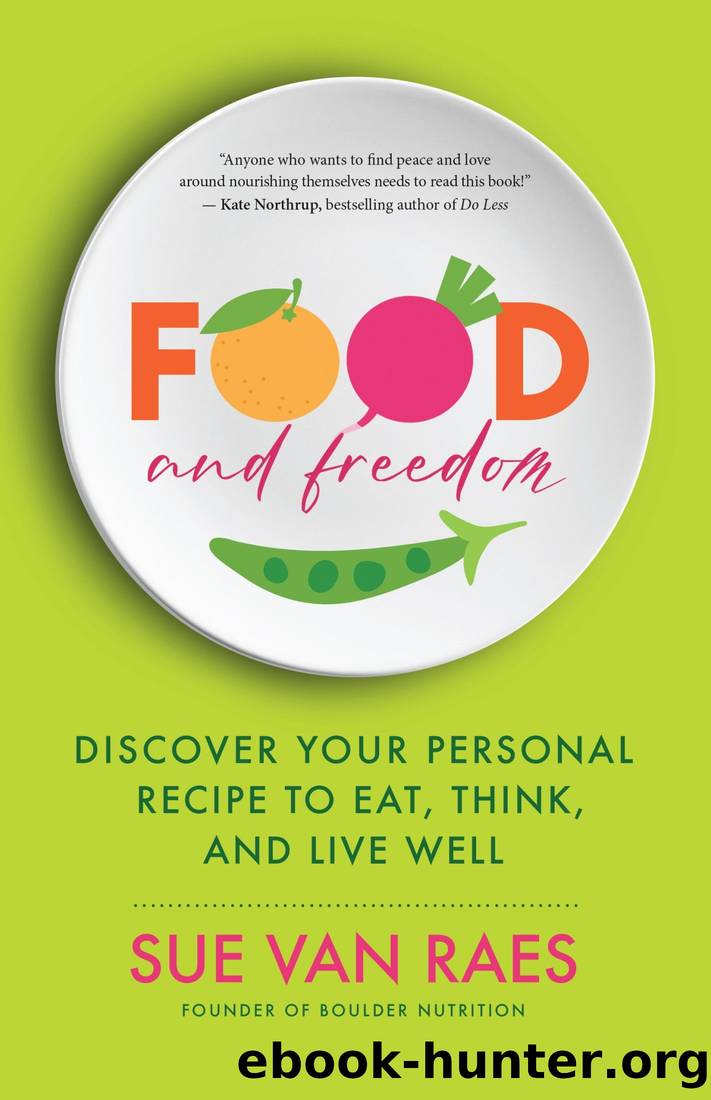FOOD AND FREEDOM-TEXT by Sue Van Raes

Author:Sue Van Raes [Raes, Sue Van]
Language: eng
Format: epub
Publisher: New World Library
Published: 2024-02-02T18:43:28+00:00
Letâs take a deeper look at these vital skills.
Stabilize for Serenity
I think it is safe to assume that deep down, we all want more peace and serenity. While some of us are prone to anxiety or hardwired to seek drama and conflict, our pure consciousness is free, peaceful, and calm. We all prefer to settle nicely into a resting state â or equilibrium.
When you are at war with your eating and your body and you are experiencing a lack of emotional equilibrium, the behaviors that ensue most often lead you further away from what you want. For example, if you struggle with anxiety, depression, or disordered eating patterns, you are more likely to become overwhelmed by a feeling because you have lower resting dopamine levels, and dopamine normally helps you regulate your emotions. To address these lower dopamine levels, you may find yourself thinking about food, or other pleasure-inducing activities, more often throughout the day, and therefore you may find yourself feeling more out of control when you are around food. Similarly, you will probably have a harder time regulating emotion when you have a stressor in your life or a challenging feeling arises. The easiest, most comforting, and most habitual thing you do to regulate your system and manage your strong emotions becomes reaching for food.
Even smelling or seeing a desired food can elevate dopamine levels, motivating your impulse to eat. But if you are someone with anxiety, depression, or binge-eating tendencies, this response can be even more intense, making your cravings feel even bigger. The dopamine spike you are after to make yourself feel better is what makes you feel out of control around food or triggers compulsive overeating. Foods that are highly processed carbohydrates or full of sugar will give you a temporary dopamine spike, but similar to your blood sugar curve, the spike will soon be followed by an abrupt crash, leaving you back with your lower resting dopamine levels â and the cycle continues. The best place to start is to keep your blood sugar balanced and your body well satiated (via eating all three macronutrients, including lower sugar and fewer processed carbohydrates), which will naturally support more stable and long-term optimal levels of dopamine.
Satiation, Dopamine, and Emotional Regulation
Hang in there with me while we talk a little bit about functional neurochemistry â the study of neurochemicals and neurotransmitters. It is through powerful clinical nutrition interventions, specifically insulin regulation and blood sugar stability, that you can find your way back to healthy dopamine levels and regulation, decreasing the likelihood that you will dive into emotional eating.
Letâs start with the very root of your health, your digestion. Like serotonin, dopamine is primarily produced by your gut bacteria. A healthy microbiome with a plethora of good bacteria and a strong digestion are vital to adequate dopamine production. Conversely, high levels of bad bacteria in your gut create by-products that destroy dopamine-making cells. If you are struggling with digestive distress, you may notice a significant correlation with more challenging emotional-eating tendencies.
Download
This site does not store any files on its server. We only index and link to content provided by other sites. Please contact the content providers to delete copyright contents if any and email us, we'll remove relevant links or contents immediately.
The Practice of Classical Palmistry by Madame la Roux(285)
How to Be Your Own Therapist by Owen O'Kane(220)
2021 Quantum Human Design Evolution Guide by Karen Curry Parker(178)
Christmas Witch (Hot Hex 3) by Susan Stephens(173)
Shadow Worlds by Andrew Wood(162)
Africa's Diabolical Entrapment: Exploring the Negative Impact of Christianity, Superstition and Witchcraft on Psychological, Structural and Scientific Growth in Black Africa! by Larr Frisky(147)
Yoga for Beginners: Your Natural Way to Strengthen Your Body, Calming Your Mind and Be in The Moment (Yoga Poses) (A Better You Book 1) by Susan Mori(136)
Learn Cold Reading: The real secret of mind readers by Reynolds Ethan(131)
Tarot de Marseille by Marius Høgnesen & Paul Marteau(128)
Design Guide to Learn Calligraphy: Fonts, Styles, Pens, Letters, & Numbers by Agatha Adams(128)
The Stuff of Dreams by Edward Lucas White(122)
Predicting Your Future through Astrology by Sita Ram Singh(115)
Miracle Minded Manager by John Murphy(115)
The Watkins Tarot Handbook by Naomi Ozaniek(109)
Tarot Journeys by Yasmine Galenorn(108)
Witch: A Magickal Journey by Fiona Horne(107)
The World's Most Mysterious Objects by Patricia Fanthorpe & Patricia Fanthorpe(105)
This is Not a Sutra by Frisk Chad(105)
The Invisible Tribe by Adrian Roman(99)
